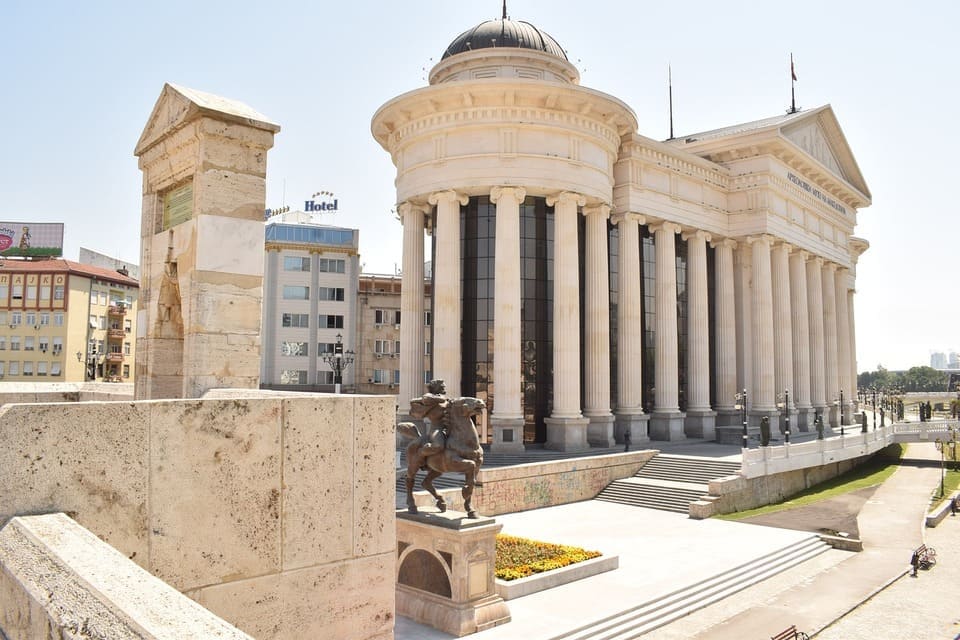
The Journey of Macedonian: A Language's Evolution
The Macedonian language offers a captivating narrative of persistence and change. In this blog, we will trace its development from early dialects to its contemporary status as an official language. We will explore the historical and cultural forces that have shaped Macedonian, showcasing its evolution within the Slavic language family and its unique characteristics. Join us as we journey through the significant events that have influenced the Macedonian language.
The Early Roots of the Macedonian Language
The Macedonian language finds its origins in the Slavic migrations into the Balkans during the 6th and 7th centuries. These initial settlers introduced the Slavic linguistic framework that would evolve into today's Macedonian. As the centuries progressed, Macedonian developed unique characteristics that distinguished it from its Slavic cousins. This development was shaped by the region's complex history and the interactions among various groups in the Balkans, helping to forge the language's identity.
Pivotal Events in the Evolution of Macedonian
- Slavic Migrations: The arrival of Slavic tribes in the Balkans during the 6th century introduced the early Slavic dialects that would eventually evolve into Macedonian.
- Byzantine Influence: As part of the Byzantine Empire, the region experienced a mixing of cultural and linguistic elements, with Greek becoming a significant influence during this era.
- Ottoman Rule: Under Ottoman dominion from the 14th to the early 20th century, Macedonian absorbed many Turkish words, reflecting the socio-political and administrative influence of the Ottomans in the region.
- Formation of Yugoslavia: The creation of Yugoslavia in the 20th century and the subsequent recognition of Macedonian as an official language in 1944, promoting its use in education, administration, and media, solidified its status and fostered its standardization.
- Independence of North Macedonia: The breakup of Yugoslavia in the 1990s led to North Macedonia’s independence, which further affirmed Macedonian's role as the national language and a key component of the country's identity.
Languages That Have Influenced the Macedonian
- Greek Influence: The incorporation of Greek elements into the Macedonian language can be attributed to several historical and cultural factors such as the political and cultural integration during Alexander the Great's reign, the use of Greek as the administrative and scholarly language in the Hellenistic kingdoms, and the enduring Greek presence in the region which continued to shape the local dialects.
- Slavic Foundations: The core of the Macedonian language is its Slavic roots, which it shares with its close linguistic relatives such as Bulgarian and Serbian. The arrival of Slavic tribes in the Balkans during the early medieval period laid the foundational structure of what would become modern Macedonian.
- Balkan Sprachbund: Macedonian, like other languages in the Balkan region, has been part of the Balkan Sprachbund, an area where languages share features across linguistic boundaries. This includes influences from Albanian and Romanian, among others, contributing to a shared set of grammatical and syntactical characteristics.
- Ottoman Turkish: During the centuries of Ottoman rule, Turkish contributed significantly to the vocabulary of Macedonian, along with other cultural influences that impacted daily life and language usage.
- Romance Languages: Due to historical interactions with the Romance languages, especially through trade and later cultural exchanges during the Renaissance, Macedonian has incorporated several Romance-based loanwords.
- Persian and Arabic: Through the Ottoman Empire's connections, Macedonian also absorbed numerous Persian and Arabic words, primarily related to administration, trade, and culture.
The Standardization of the Macedonian Language
The standardization of the Macedonian language in the mid-20th century was a pivotal factor in shaping the modern Macedonian identity. This process formally began with the codification of the language in 1945, following the establishment of the Macedonian Republic within Yugoslavia. This effort aimed to distinguish Macedonian from related Slavic languages, particularly Bulgarian and Serbian, and to foster a distinct national identity. Linguists and scholars worked to standardize grammar, orthography, and vocabulary, which not only solidified Macedonian's status as an official language but also reinforced its role in education, media, and government. The standardization was not merely a linguistic endeavor but also a cultural and political project, deeply intertwined with the broader goals of asserting Macedonian sovereignty and cultural uniqueness in the Balkans.
Political Recognition and Independence
The recognition of the Macedonian language as an official language of Macedonia came with the establishment of the Socialist Federal Republic of Yugoslavia in the aftermath of World War II. The Macedonian language gained official status and began to flourish in education, literature, and media. Following the breakup of Yugoslavia, the Republic of North Macedonia emerged as an independent nation, solidifying the Macedonian language's status as the official language of the country.
The origin of the Macedonian language remains a captivating area of study, with ongoing research and debates among scholars. As a Slavic language, it traces its roots back to the ancestral Proto-Slavic language. Influences from Old Church Slavonic, regional dialects, the Balkan region, and the Ottoman Empire have contributed to the unique linguistic features and vocabulary of Macedonian. The linguistic evolution and standardization of the Macedonian language have played a crucial role in the cultural and national identity of the people of North Macedonia, enriching their heritage and connecting them to a diverse linguistic tapestry.







